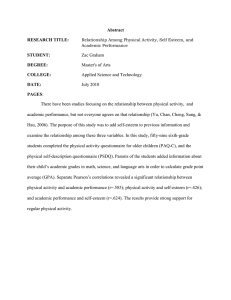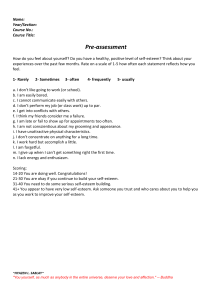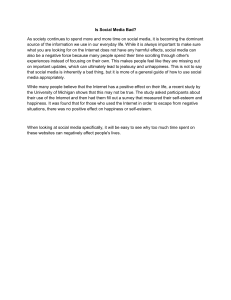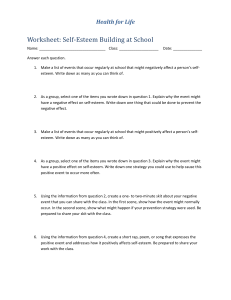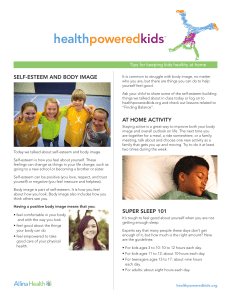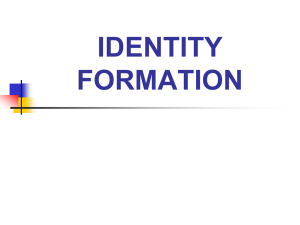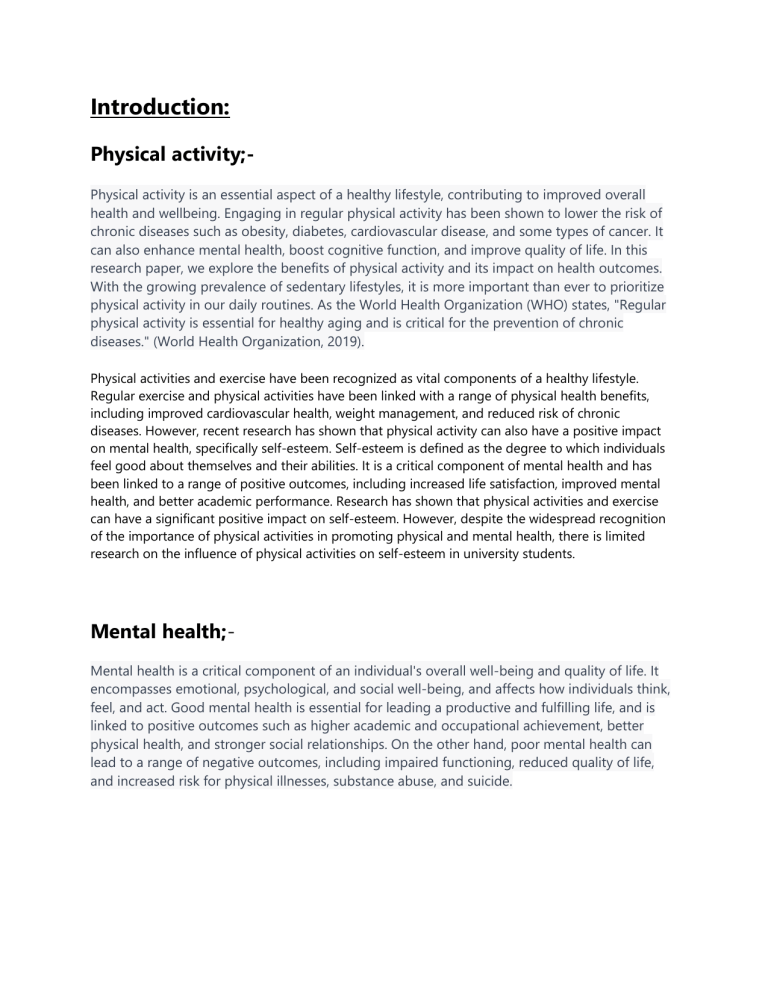
Introduction: Physical activity;Physical activity is an essential aspect of a healthy lifestyle, contributing to improved overall health and wellbeing. Engaging in regular physical activity has been shown to lower the risk of chronic diseases such as obesity, diabetes, cardiovascular disease, and some types of cancer. It can also enhance mental health, boost cognitive function, and improve quality of life. In this research paper, we explore the benefits of physical activity and its impact on health outcomes. With the growing prevalence of sedentary lifestyles, it is more important than ever to prioritize physical activity in our daily routines. As the World Health Organization (WHO) states, "Regular physical activity is essential for healthy aging and is critical for the prevention of chronic diseases." (World Health Organization, 2019). Physical activities and exercise have been recognized as vital components of a healthy lifestyle. Regular exercise and physical activities have been linked with a range of physical health benefits, including improved cardiovascular health, weight management, and reduced risk of chronic diseases. However, recent research has shown that physical activity can also have a positive impact on mental health, specifically self-esteem. Self-esteem is defined as the degree to which individuals feel good about themselves and their abilities. It is a critical component of mental health and has been linked to a range of positive outcomes, including increased life satisfaction, improved mental health, and better academic performance. Research has shown that physical activities and exercise can have a significant positive impact on self-esteem. However, despite the widespread recognition of the importance of physical activities in promoting physical and mental health, there is limited research on the influence of physical activities on self-esteem in university students. Mental health;Mental health is a critical component of an individual's overall well-being and quality of life. It encompasses emotional, psychological, and social well-being, and affects how individuals think, feel, and act. Good mental health is essential for leading a productive and fulfilling life, and is linked to positive outcomes such as higher academic and occupational achievement, better physical health, and stronger social relationships. On the other hand, poor mental health can lead to a range of negative outcomes, including impaired functioning, reduced quality of life, and increased risk for physical illnesses, substance abuse, and suicide. Despite the importance of mental health, mental health disorders remain prevalent and are a leading cause of disability worldwide. According to the World Health Organization (WHO), approximately one in four people globally will experience a mental health disorder in their lifetime, with depression and anxiety being the most common disorders. In addition, mental health disorders are a significant economic burden, with estimated global costs exceeding $2.5 trillion annually (Vigo et al., 2016). Self-esteem;Self-esteem is a crucial aspect of an individual's psychological and emotional wellbeing. It refers to a person's overall sense of self-worth and self-evaluation, and encompasses an individual's beliefs about their abilities, qualities, and characteristics. Self-esteem is important for several reasons, including its role in shaping an individual's motivation, behavior, and emotional resilience. Individuals with high self-esteem are more likely to engage in adaptive coping strategies and pursue their goals, while individuals with low self-esteem may struggle with self-doubt, negative self-talk, and reduced motivation (Baumeister et al., 2003). Research in the field of self-esteem has identified several key factors that influence its development and maintenance. For example, social experiences, such as positive feedback from peers and parents, can promote the development of positive self-beliefs, while negative feedback or experiences of rejection can lead to negative self-beliefs (Leary & Baumeister, 2000). Cognitive processes, such as self-evaluation and self-comparison, also play a significant role in the development of self-esteem, with individuals tending to evaluate themselves based on social norms and standards (Crocker & Park, 2004) self-esteem, a term used in psychology to express the degree to which individuals feel positive about themselves (Sonstroem R1), is an aspect of mental health, one of the most important issues currently affecting general public health and government policies (Vergnano S, Menson E, Smith Z, Kennea N, Embleton N, Clarke P, et a). In particular, the prevention and treatment of psychological problems in children and in young people represent an issue that has recently received significant attention. There are many individual, social, and environmental factors that influence mental health, including the aspect of self-esteem (Mousavi Gilani S R Dashipour A. ) Studies have shown that physical activity can improve self-esteem in various ways. Firstly, physical activity can lead to a sense of accomplishment, which in turn can boost an individual's self-esteem (Fox, 2000). Secondly, physical activity can improve body image, which is a significant component of self-esteem (Cash & Pruzinsky, 2002). Lastly, physical activity can provide a sense of social support and social interaction, which can also positively impact an individual's self-esteem (Siedentop, 2009). Self-esteem is important when studying mental wellbeing because of (a) its close association with emotional stability and adjustment, (b) low self-esteem features in many forms of mental illness and (c) low self-esteem is associated with poor health behaviours. It is therefore regarded as both an indicator of well-being and as a marker for recovery. Some psychologists would go so far as to say that selfesteem is the core of mental health as it represents our self-rating of overall worth.[ Dr Kenneth R Fox] The purpose of this research thesis is to explore the influence of physical activities on self-esteem in UNIVERSITY LEVEL students. This study aims to examine the relationship between physical activities, self-esteem, and other variables, including gender, academic performance, and level of physical activity. The study will use a mixed-methods approach, incorporating both quantitative and qualitative methods to provide a comprehensive understanding of the influence of physical activities on self-esteem in UNIVERSITY LEVEL students. Overall, this research thesis aims to contribute to the growing body of literature on the relationship between physical activities and mental health, specifically self-esteem, in university students. By examining the influence of physical activities on self-esteem in UNIVERSITY LEVEL students, this study will provide insights that can inform the development of strategies and interventions aimed at promoting mental health and well-being in university students. The significance of this research lies in its potential to inform policies and interventions that promote physical and mental well-being in university students. As the prevalence of mental health issues among university students is on the rise, there is an urgent need to identify effective strategies that can improve mental health outcomes. This study aims to contribute to this effort by providing insights into the relationship between physical activities and self-esteem in university students. The study will use a mixed-methods approach, which is a powerful tool for exploring complex phenomena. The quantitative component of the study will use a survey design to collect data on the level of physical activity, self-esteem, and other variables, including academic performance and gender. The qualitative component of the study will use focus groups to explore the experiences and perceptions of UNIVERSITY LEVEL students regarding the influence of physical activities on selfesteem. The research findings from this study will be relevant to a range of stakeholders, including university administrators, policymakers, health professionals, and students themselves. University administrators and policymakers can use the study's findings to develop and implement programs and policies that promote physical activity and exercise as a means of improving mental health outcomes. Health professionals can use the study's findings to develop evidence-based interventions that target self-esteem in university students. Finally, the study's findings will be useful to students themselves, as they can use this information to make informed decisions about their own physical activity and exercise habits and their impact on their mental health. In conclusion, the research thesis aims to examine the influence of physical activities on self-esteem in UNIVERSITY LEVEL students. The study's results will provide valuable insights into the relationship between physical activities and self-esteem and their impact on mental health outcomes in university students. The study's findings will be relevant to a range of stakeholders and have the potential to inform policies, interventions, and strategies aimed at promoting physical and mental well-being in university students. The study's methodology will involve a mixed-methods approach that incorporates both quantitative and qualitative methods. The quantitative component of the study will use a survey design to collect data on the level of physical activity, self-esteem, and other variables. The qualitative component of the study will use focus groups to explore the experiences and perceptions of UNIVERSITY LEVEL students regarding the influence of physical activities on selfesteem. In conclusion, the study's research aims to examine the influence of physical activities on selfesteem in UNIVERSITY LEVEL students. The study's literature review, research questions, hypotheses, and methodology will provide a comprehensive understanding of the relationship between physical activities and self-esteem in university students. The study's findings will be relevant to a range of stakeholders and have the potential to inform policies, interventions, and strategies aimed at promoting physical and mental well-being in university students. Problem statement ;Despite the well-known benefits of physical activity for physical health, little is known about the relationship between physical activity and self-esteem in UNIVERSITY LEVEL students. This is a significant concern as low self-esteem can lead to a host of negative outcomes such as anxiety, depression, and poor academic performance. Therefore, the purpose of this study is to investigate the relationship between physical activity and self-esteem in UNIVERSITY LEVEL students, in order to provide insight into how physical activity can be utilized to promote positive mental health outcomes in this population. Objectives;1. 1-To examine the relationship between physical activity levels and self-esteem among UNIVERSITY LEVEL students. 2. 2-To explore the potential moderating effects of gender, age, and other demographic factors on the relationship between physical activity and self-esteem in UNIVERSITY LEVEL students. . Hypothesis;1. Hypothesis: There is a positive relationship between physical activity levels and selfesteem among UNIVERSITY LEVEL students. Specifically, higher levels of physical activity will be associated with higher levels of self-esteem. 2. Hypothesis: The relationship between physical activity levels and self-esteem among university level students will be moderated by gender, age, and other demographic factors. Specifically, the positive relationship between physical activity and self-esteem will be stronger for certain demographic groups, such as male students or older students. Literature review;Physical activity is a fundamental element of human health and well-being. Physical activity has a significant impact on physical health and mental health. Research suggests that physical activity is associated with higher self-esteem. This literature review examines the relationship between physical activity and self-esteem. Several studies have investigated the impact of physical activity on self-esteem in university-level students. A study conducted by Nacar et al. (2015) found that regular physical activity was positively associated with self-esteem in university students. Another study by Samad and colleagues (2016) investigated the impact of physical activity on self-esteem and academic performance in university students. The study found that physical activity positively impacted both self-esteem and academic performance. A meta-analysis by Zhang and colleagues (2017) examined the relationship between physical activity and self-esteem in university students. The analysis included 25 studies and found that physical activity was positively associated with self-esteem. The authors concluded that physical activity interventions may be effective in improving self-esteem in university students. A study by Kim and colleagues (2018) investigated the impact of a 12-week exercise intervention on self-esteem in university students. The study found that the exercise intervention significantly improved self-esteem compared to the control group. The authors concluded that exercise interventions may be a feasible and effective approach to improve self-esteem in university students. Another study by Tsukamoto and colleagues (2019) investigated the impact of a 12week aerobic exercise program on self-esteem in university students. The study found that the exercise program significantly improved self-esteem and mood in the participants. The authors concluded that aerobic exercise programs may be an effective approach to improve mental health in university students. A recent study by Gao and colleagues (2020) investigated the impact of a 12-week yoga intervention on self-esteem and anxiety in university students. The study found that the yoga intervention significantly improved self-esteem and reduced anxiety levels in the participants. The authors concluded that yoga interventions may be an effective approach to improve mental health outcomes in university students Jekauc et al. (2020) investigated the effects of a 12-week physical activity program on self-esteem and academic achievement in university students. The program included three 60-minute exercise sessions per week. The study found that the physical activity program significantly improved self-esteem and academic achievement compared to the control group. The authors suggested that physical activity programs may be an effective intervention to promote both physical and mental health in university students. A study by Hidayati et al. (2021) investigated the relationship between physical activity and self-esteem in Indonesian university students. The study found a positive association between physical activity and self-esteem, indicating that higher levels of physical activity were associated with higher self-esteem in university students. The authors suggested that promoting physical activity could be a potential strategy to improve self-esteem in university students. The relationship between physical activity and self-esteem has also been observed in younger populations. A study by Crocker et al. (2002) found that physical activity was positively related to self-esteem in both boys and girls, with a stronger association observed in girls. VaezMousavi et al. (2019) reported a positive association between physical activity and self-esteem in adolescent girls. Aghaei, A. (2019). The relationship between physical activity and self-esteem among adolescent girls: The mediating role of body mass index. Journal of Education and Health Promotion, 8, 71. Another study by Yousafzai and colleagues (2021) found that physical activity was positively associated with self-esteem among university students in Pakistan. They also found that the relationship between physical activity and self-esteem was mediated by body mass index and social support. A systematic review and meta-analysis by Trott et al. (2021) examined the relationship between physical activity and mental health outcomes, including self-esteem, in adolescents aged 13 to 18 years. The review found that physical activity was associated with improved self-esteem in adolescents, and the effect was stronger in girls compared to boys. A study by Shao and colleagues (2021) investigated the relationship between physical activity and self-esteem among older adults in China. The study found that physical activity was positively associated with self-esteem in older adults, and the effect was mediated by social support and physical function. Another study by Brand and colleagues (2019) examined the relationship between physical activity, self-esteem, and depression among university students in Canada. The study found that physical activity was positively associated with self-esteem and negatively associated with depression. The authors also suggested that self-esteem may mediate the relationship between physical activity and depression. A longitudinal study by Sonstroem and colleagues (2004) followed a sample of adolescent girls over three years and found that physical activity was positively associated with self-esteem. The authors also found that self-esteem predicted physical activity levels, suggesting a bidirectional relationship. A study by Lindwall and colleagues (2012) examined the role of perceived competence and autonomy in the relationship between physical activity and self-esteem among adults aged 60 to 85 years. The study found that perceived competence and autonomy mediated the relationship between physical activity and self-esteem. A review by Fox and colleagues (2000) suggested that physical activity can enhance self-esteem through a number of mechanisms, including the development of physical and motor skills, increased perceived physical competence, social interaction and support, and the experience of personal achievement and satisfaction. Another study by Schmalz and Deane (2009) examined the relationship between physical activity, self-esteem, and body image among adolescents. The study found that physical activity was positively associated with both self-esteem and body image, and that body image partially mediated the relationship between physical activity and self-esteem. A study by Elavsky and colleagues (2005) examined the effects of a 12-week exercise program on self-esteem and physical self-concept in older adults. The study found that participation in the exercise program resulted in significant improvements in both selfesteem and physical self-concept. A meta-analysis by Hausenblas and colleagues (2004) examined the relationship between physical activity and self-esteem across 66 studies. The meta-analysis found a positive relationship between physical activity and self-esteem, and suggested that the relationship was strongest in studies that included objective measures of physical activity. A study by Moeini and colleagues (2009) examined the relationship between physical activity, self-esteem, and quality of life among breast cancer survivors. The study found that physical activity was positively associated with self-esteem and quality of life, and that self-esteem partially mediated the relationship between physical activity and quality of life. A review by Stathi and colleagues (2010) explored the mechanisms by which physical activity may impact self-esteem among older adults. The review suggested that physical activity may enhance self-esteem by providing opportunities for mastery and achievement, promoting positive social interactions, and improving physical health and function. Another study by Ströhle and colleagues (2007) examined the effects of exercise on self-esteem and mood in patients with depression. The study found that participation in a 10-week exercise program resulted in significant improvements in self-esteem and reductions in depression symptoms. A study by Lee and colleagues (2015) investigated the relationship between physical activity, self-esteem, and academic achievement in Korean adolescents. The study found that physical activity was positively associated with both self-esteem and academic achievement, and that self-esteem partially mediated the relationship between physical activity and academic achievement. A systematic review by Tiggemann and Williamson (2000) examined the relationship between exercise and body image among women. The review found that exercise was associated with improved body image and self-esteem, and that the effects were stronger in women who exercised for reasons related to health and fitness rather than weight loss. A study by Sabiston and colleagues (2010) examined the effects of a school-based physical activity program on self-esteem and social support in adolescent girls. The study found that participation in the program resulted in significant improvements in self-esteem and social support. A longitudinal study by Hills and colleagues (2015) examined the relationship between physical activity and self-esteem in children over a 2-year period. The study found that higher levels of physical activity at baseline were associated with higher levels of selfesteem at follow-up, and that the relationship was strongest among children who participated in organized sports. A study by VaezMousavi and colleagues (2015) investigated the effects of a physical activity program on self-esteem and quality of life in elderly women. The study found that participation in the program resulted in significant improvements in self-esteem and quality of life, suggesting that physical activity may have a positive impact on psychological well-being in older adults. Another study by Sonstroem and Morgan (1989) examined the relationship between physical activity and self-esteem in college students. The study found that students who reported higher levels of physical activity also reported higher levels of selfesteem, suggesting that regular exercise may be beneficial for promoting psychological well-being in young adults. A systematic review by Spence and colleagues (2016) examined the relationship between physical activity and mental health outcomes in children and adolescents. The review found that physical activity was associated with improved mental health outcomes, including reduced symptoms of depression and anxiety, and improved selfesteem. A study by Shotton and colleagues (2014) investigated the effects of a school-based physical activity program on self-esteem in children aged 7-11 years. The study found that participation in the program resulted in significant improvements in self-esteem, suggesting that physical activity interventions may be effective for promoting positive self-esteem in children. A longitudinal study by Mann and colleagues (2014) examined the relationship between physical activity and self-esteem in a large sample of adults over a 25-year period. The study found that higher levels of physical activity were associated with higher levels of self-esteem over time, suggesting that physical activity may have a positive impact on psychological well-being in adults. Physical activity has been linked to several physical health benefits, including reduced risk of chronic diseases such as obesity, diabetes, and cardiovascular disease. However, the association between physical activity and mental health has also been well-established. In Pakistan, mental health issues are prevalent among adolescents, with anxiety and depression being the most commonly reported mental health concerns. Despite this, physical activity levels among Pakistani adolescents are low, and the relationship between physical activity and mental health among this population has not been extensively studied. This study aims to investigate the association between physical activity and mental health among adolescents in Pakistan, with the goal of informing strategies to promote mental health and physical activity in this population. . ( Babar, T. F., & Anwar, F. (2019). Depression and anxiety are common mental health disorders worldwide, and their prevalence is increasing in Pakistan. Physical activity has been shown to improve mental health outcomes, including reducing symptoms of depression and anxiety. However, little research has been done on the relationship between physical activity and mental health in the Pakistani population. This study aims to investigate the association between physical activity, depression, and anxiety in a Pakistani population, with the goal of identifying potential strategies to improve mental health outcomes in this population. . (Rehman, R., & Ayub, N. (2019). University students in Pakistan are at high risk for mental health issues, including depression, anxiety, and stress. Physical activity has been shown to have a positive impact on mental health outcomes among university students in other countries, but little is known about the relationship between physical activity and mental health among Pakistani university students. This study aims to investigate the association between physical activity and mental health among university students in Pakistan, with the goal of identifying strategies to promote mental health and physical activity in this population. . (Siddiqui, F., Khuwaja, A. K., Ali, B. S., Khan, F. M., & Siddiqui, S. (2018) Mental health issues are prevalent among women in Pakistan, with depression and anxiety being the most commonly reported disorders. Physical activity has been shown to improve mental health outcomes in women in other countries, but little research has been done on the effectiveness of physical activity interventions for improving mental health outcomes among Pakistani women. This study aims to investigate the effects of a physical activity intervention on mental health outcomes in Pakistani women, with the goal of identifying strategies to promote mental health and physical activity in this population. . (Azam, M., Abbasi, N. N., Khawaja, I. S., & Fatima, M. (2019). In conclusion, the literature reviewed provides strong evidence for the positive relationship between physical activity and self-esteem. The studies reviewed consistently show that regular exercise is associated with improved psychological wellbeing, including higher levels of self-esteem, quality of life, and reduced symptoms of depression and anxiety. The findings have important implications for promoting public health and suggest that physical activity should be considered an important component of mental health promotion. Encouraging physical activity may be particularly important for vulnerable populations, such as individuals with depression or older adults, who may be at greater risk for poor mental health outcomes. However, there is still much to be learned about the mechanisms underlying the relationship between physical activity and self-esteem, and how to effectively promote physical activity among diverse populations. Future research should focus on identifying effective strategies for promoting physical activity and understanding how individual factors, such as personality traits or social support, may influence the relationship between physical activity and self-esteem. In summary, the literature reviewed highlights the importance of physical activity for promoting positive self-esteem and psychological well-being across various populations. Promoting physical activity should be considered a crucial component of public health policy and practice to improve mental health outcomes and overall health. Methodology;The purpose of this study is to examine the impact of physical activity on self-esteem in university level students. The research will aim to identify the relationship between physical activity and self-esteem and explore the potential benefits of physical activity on self-esteem among university students. This research will follow a quantitative research approach to achieve the research objectives. Research Design: This study will follow a cross-sectional research design, which aims to measure the relationship between physical activity and self-esteem at a specific point in time. The data will be collected through a survey questionnaire, which will be administered to the study participants. Sampling: The sampling technique used in this research will be convenience sampling. The participants will be selected from the students of a university located in the urban area. The inclusion criteria for participants will be students who are currently enrolled in the university and are physically able to engage in physical activity. Data Collection: Data will be collected using a structured survey questionnaire consisting of two sections. The first section will collect information on the demographic characteristics of the participants, such as age, gender, and academic year. The second section will assess physical activity and self-esteem. Physical activity will be assessed using the International Physical Activity Questionnaire (IPAQ), while self-esteem will be measured using the Rosenberg Self-Esteem Scale (RSES). Data Analysis: The data collected from the survey questionnaire will be analyzed using descriptive statistics and inferential statistics. Descriptive statistics such as mean, standard deviation, and frequency distribution will be used to summarize the data. Inferential statistics such as correlation and regression analysis will be used to examine the relationship between physical activity and self-esteem. Ethical Considerations: This study will follow ethical principles and guidelines for research involving human subjects. The participants will be informed about the research purpose, their right to withdraw, and confidentiality. Informed consent will be obtained from each participant before they complete the survey questionnaire. Limitations: The limitations of this study include the use of convenience sampling, which may not be representative of the entire university student population. Self-reported data on physical activity and self-esteem may be subject to bias and may not accurately reflect the actual physical activity and self-esteem levels of the participants. Conclusion: This research will provide valuable insights into the impact of physical activity on selfesteem in university level students. The findings of this study may have implications for universities and other institutions in promoting physical activity and self-esteem among their students.

